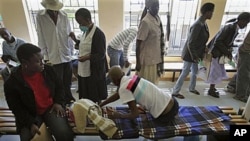Medical researchers are concerned the lack of new medicines developed to treat tuberculosis will encourage drug-resistant strains. More than 200 researchers are meeting at a symposium in Cameroon this week to discuss future steps.
Head of the Novartis Institutions for Developing World Medical Research, Dr. Paul Herrling, said there are many reasons tuberculosis is an increasing problem in places like Sub-Saharan Africa.
"The first one is that the last medicines that we had for TB are about 40 years old," he explained. "And one thing that people did not know at that time, is that this is a very, very clever bacteria - like many others. And when they are treated with the same medicines for a long time, they learn to escape it."
The Novartis Institute is holding the symposium to address challenges and try to determine possible solutions to tuberculosis. Herrling added it that it was crucial to hold the conference in a country that is affected by tuberculosis, because too often the scientists developing the treatments do not understand the everyday realities of their patients.
"It is extremely important to understand not only the molecular biology of your patients, but their culture, their environment, their problems," said Herrling. "And so very often our scientists, they live in laboratories working on TB sitting in Harvard or in London, and they have no clue as to what the disease really is. And on the other hand, local doctors here have no access to the most modern science."
The institute notes that of the 9 million people diagnosed with tuberculosis last year, 30 percent live in Africa. The disease also is increasingly prevalent among people with HIV/AIDS and kills two million annually.
"So many people are infected with tuberculosis, but they are healthy and have no symptoms, because their immune system keeps it in check," Herrling said. "And of course, exactly what HIV does, it weakens your immune system and then those people who were healthy before now become actively sick and can infect others. So it is very much reinforcing or making the problem much worse."
Some patients in rural Africa have a problem completing treatment with an antibiotic called isoniazid. Many fail to complete the treatment that lasts from six to eight months, and even more in some cases.
Researchers: New Tuberculosis Medicine Urgently Needed
